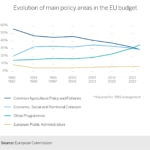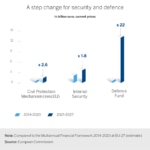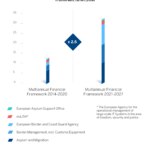From 2021, how will the EU spend its budget?
Of the tax revenue paid by Europeans, only one euro per taxpayer is used to finance the EU's budget. In total, the EU manages a budget of about 1% of the gross national income of its member states. Nonetheless, how this money is invested directly impacts Europeans’ lives; it is therefore of interest to understand the EU budget as of 2021, the first spending plan after the UK's exit from the EU.

Last week, the European Commission presented a budget proposal based on the priorities set forth by Jean-Claude Juncker in the White Paper on the Future of Europe, published last year. The accounts planned for 2021-2027 will be the first budgets of the post-Brexit era. Accordingly, the EC has already warned that from now on it will be necessary “to make do with less.” According to the European Commission, the removal of the United Kingdom’s net contribution to the EU's budget will leave a hole in Europe's coffers of between €12 and €15 billion per year.
In the Reflection paper on the future of Europe (published in June 2017), the Commission already flagged the policy priorities that would receive most of the European expenditure: strengthening Europe's economy, improved sustainability and solidarity of European finances, migration, and internal and external defense and security.
From here a process is opened for debate in the heart of European institutions. The European Council, European Parliament, and the European Commission have to reach agreement over the European accounts. The EC hopes to reach consensus before the European parliamentary elections in May 2019—before the end of the current Commission's mandate, which concludes on October 31, 2019.
What does the proposed European budget look like?
The EC has defined its proposal as “modern, simple, and flexible.” The European institution proposes a budget of €1.135 trillion in commitment appropriations, the equivalent of 1.11% of the gross national income of the EU 27.
Among the new items included in the proposed financial framework, there are two new instruments to strengthen the economic and monetary union and promote greater social justice in the EU. The first of these is the Structural Reform Support Program with a budget of €25 billion. Its objective is to provide assistance to member states to complete necessary reforms stipulated by the European Semester, where the European institutions evaluate the economic and budgetary policies of the member states and their conformity to the EU's economic objectives with the goal of putting an end to macroeconomic imbalances.
The second is the European Investment Stabilization Function, which seeks to maintain investment levels in the event of large asymmetric shocks like those that occurred during the last economic crisis. With a maximum budget of €30 billion, this instrument will be initiated in the form of back-to-back loans, providing extra support at a time when public finances are stretched. These loans should be geared toward maintaining priority investments.

Some areas such as the Common Agricultural Policy (CAP) or Europe’s cohesion policy lose weight in the new European accounts (around 5% according to the proposal.) On the other hand, areas such as security and border controls have seen their proposed portion of the budget expand, in the case of security up 40% (reaching €4.8 billion) while proposed spending on border control has tripled (rising to €33 billion).
Other areas where the Commission's budgetary proposal significantly increases funding are in programs for young people, which will double in quantity; and investment in digital transformation, which will total €12 million, nine times the current allocation, according to the EC proposal.


In addition to these changes, the EC proposes to create an instrument that would allow linking a member state's receipt of European funding with compliance to rule of law precepts.
From this point, the next step is to secure the Council’s opinion, which should unanimously approve the proposal, with the prior approval of the European Parliament. As the European Commission has explained, its objective is to have the accounts approved prior to the European parliamentary elections (to be held between May 23rd and 26th of 2019) so that the budget can be fully in force by January 2021.